Europe Holiday Calendar 2025
Related Articles: Europe Holiday Calendar 2025
- Calendar 2025: Easter Sunday
- Rit School Calendar 2025
- BBC Countryfile Calendar 2025 Competition: Capture The Essence Of Rural Britain
- Disney 2025 Daily Calendar: A Journey Through Magical Moments
- Create A Comprehensive 2025 Calendar In A Single Google Sheet
Introduction
With great pleasure, we will explore the intriguing topic related to Europe Holiday Calendar 2025. Let’s weave interesting information and offer fresh perspectives to the readers.
Table of Content
Video about Europe Holiday Calendar 2025
Europe Holiday Calendar 2025
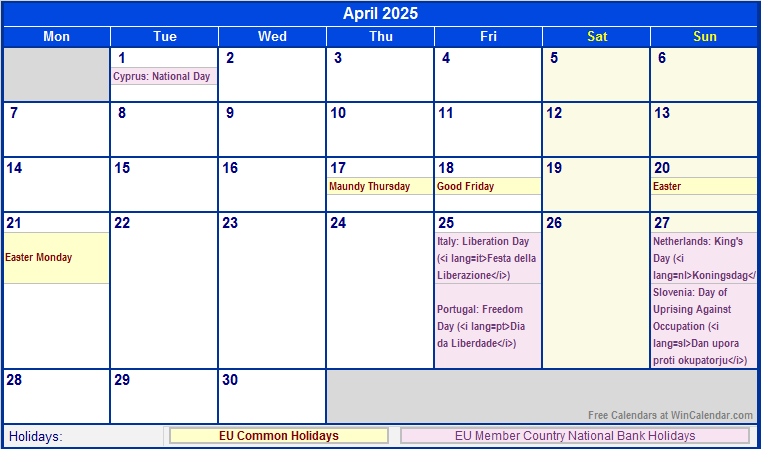
Europe, a continent steeped in history, culture, and diverse traditions, offers a year-round tapestry of holidays and festivals that captivate visitors from far and wide. From the lively street parties of Carnival to the solemn commemorations of Remembrance Day, Europe’s holiday calendar is a vibrant mosaic of local customs, religious observances, and national celebrations.
As you plan your European adventure in 2025, this comprehensive guide will serve as your indispensable companion, providing a detailed overview of the most significant holidays and festivals that will grace the continent’s calendar. From the bustling markets of Christmas to the vibrant parades of Pride, Europe’s holiday spirit is sure to ignite your senses and leave lasting memories.
January
- New Year’s Day (January 1st): A universal celebration marking the beginning of a new year, observed with fireworks, parties, and resolutions.
- Epiphany (January 6th): A Christian holiday commemorating the visit of the Three Wise Men to the infant Jesus, celebrated with processions and the sharing of traditional cakes.
February
- Carnival (February 17th – March 4th): A pre-Lenten celebration characterized by colorful parades, elaborate costumes, and festive revelry. Major celebrations take place in Venice, Nice, and Cologne.
- Valentine’s Day (February 14th): A romantic holiday dedicated to love and affection, celebrated with gifts, chocolates, and romantic gestures.
March
- Saint Patrick’s Day (March 17th): An Irish holiday honoring the patron saint of Ireland, celebrated with parades, green attire, and traditional Irish music and dance.
- Mother’s Day (March 8th): A day to celebrate and honor mothers, observed with gifts, flowers, and family gatherings.
April
- Easter (April 13th – April 20th): A Christian holiday commemorating the resurrection of Jesus Christ, observed with religious services, family gatherings, and Easter egg hunts.
- Anzac Day (April 25th): A national holiday in Australia and New Zealand commemorating the Australian and New Zealand Army Corps (ANZAC) who fought in the Gallipoli campaign during World War I.
May
- May Day (May 1st): A traditional holiday celebrating the arrival of spring, marked by parades, dancing, and the crowning of a May Queen.
- Liberation Day (May 8th): A holiday commemorating the end of World War II in Europe, observed with parades, speeches, and ceremonies.
June
- Whit Monday (May 26th): A Christian holiday celebrating the descent of the Holy Spirit upon the apostles, observed with religious services and family gatherings.
- Father’s Day (June 22nd): A day to celebrate and honor fathers, observed with gifts, family gatherings, and outdoor activities.
July
- Bastille Day (July 14th): A French national holiday commemorating the storming of the Bastille prison in 1789, celebrated with parades, fireworks, and dancing.
- Tour de France (July – August): A prestigious cycling race that traverses the scenic landscapes of France, attracting millions of spectators.
August
- Assumption of Mary (August 15th): A Christian holiday celebrating the belief that the Virgin Mary was taken into heaven, observed with religious processions and pilgrimages.
- Edinburgh Fringe Festival (August): The world’s largest arts festival, featuring a diverse program of theater, comedy, dance, and music.
September
- Oktoberfest (September – October): A world-famous beer festival held in Munich, Germany, featuring traditional Bavarian music, food, and costumes.
- Harvest Festival (September): A traditional festival celebrating the end of the harvest season, observed with feasts, dancing, and the crowning of a Harvest Queen.
October
- Halloween (October 31st): A spooky holiday with Celtic origins, celebrated with costumes, trick-or-treating, and pumpkin carving.
- Reformation Day (October 31st): A Protestant holiday commemorating the start of the Protestant Reformation in 1517, observed with religious services and speeches.
November
- All Saints’ Day (November 1st): A Christian holiday honoring all Christian saints, observed with religious services and visits to cemeteries.
- Armistice Day (November 11th): A day of remembrance for the end of World War I, observed with ceremonies and the wearing of poppies.
December
- Saint Nicholas Day (December 6th): A holiday honoring Saint Nicholas, the patron saint of children, celebrated with gift-giving and the tradition of leaving shoes out for presents.
- Christmas (December 25th): A Christian holiday commemorating the birth of Jesus Christ, celebrated with religious services, family gatherings, gift-giving, and festive decorations.
- Boxing Day (December 26th): A British holiday following Christmas Day, observed with sporting events, shopping, and family gatherings.
Additional Tips for Planning Your European Holiday
- Research local customs and traditions: Familiarize yourself with the specific customs and traditions associated with the holidays you plan to experience to avoid any cultural faux pas.
- Book accommodations and transportation in advance: Popular holidays can attract large crowds, so it’s essential to secure accommodations and transportation well in advance to avoid disappointment.
- Pack accordingly: Consider the weather conditions and the nature of the holidays you will be attending when packing your luggage.
- Be respectful of local customs: Respect the traditions and customs of the country you are visiting, and behave in a respectful and appropriate manner.
- Embrace the festive spirit: Immerse yourself in the festive atmosphere by participating in local events, trying traditional foods, and engaging with the locals.
As you navigate the vibrant tapestry of Europe’s holiday calendar, you will encounter a kaleidoscope of cultures, traditions, and celebrations that will enrich your travels and create memories that will last a lifetime. From the grandeur of Christmas markets to the infectious energy of Carnival, Europe’s holidays offer a unique opportunity to experience the continent’s rich heritage and embrace its joie de vivre.
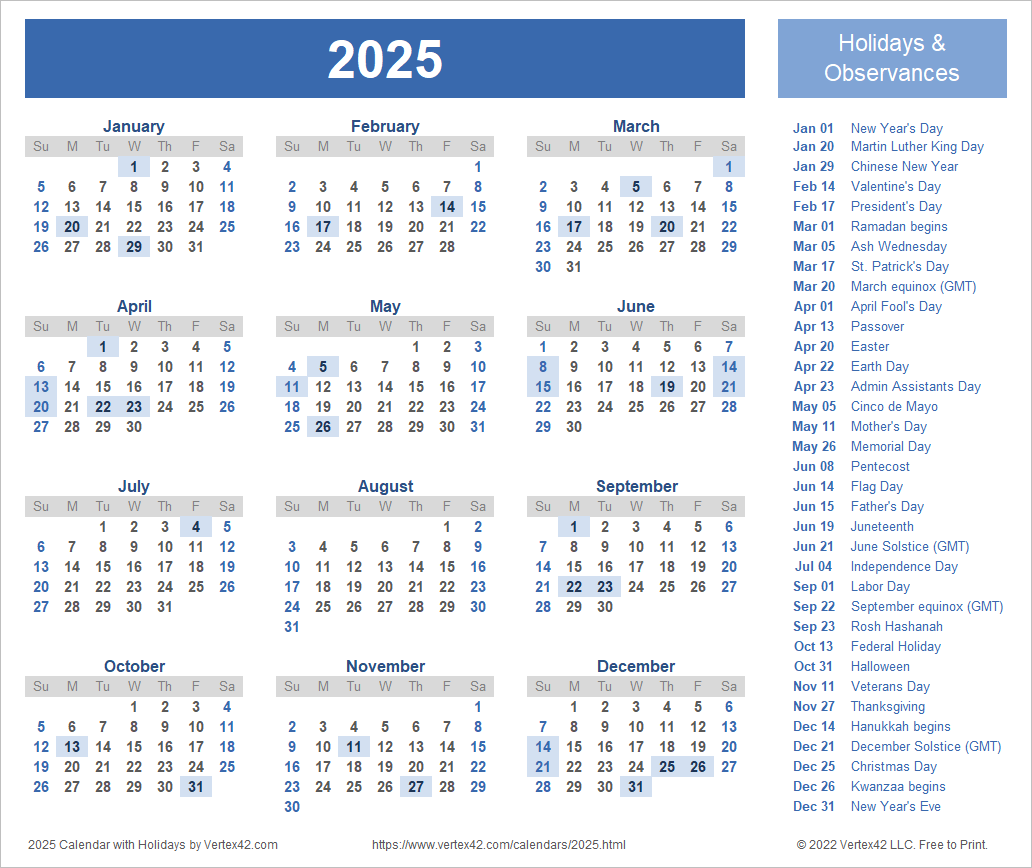

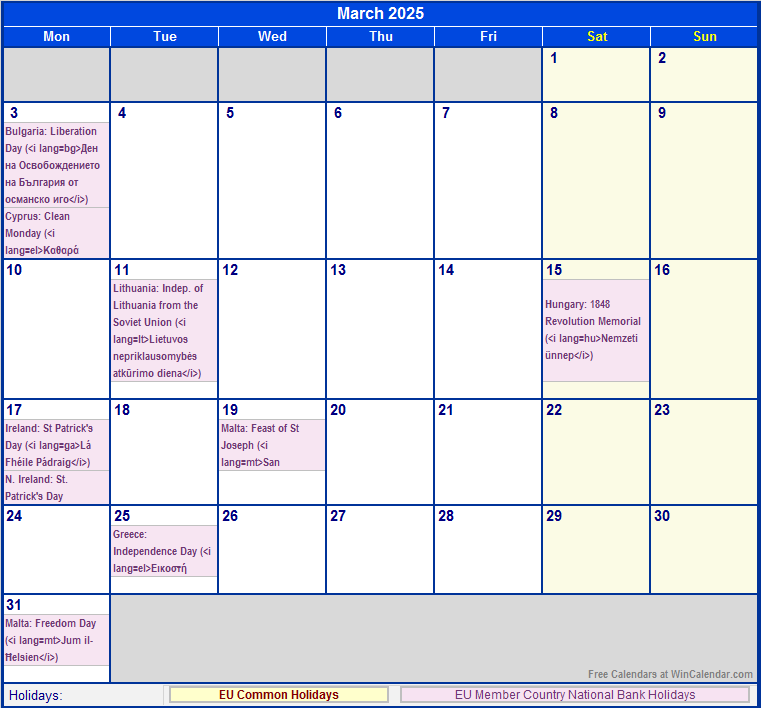
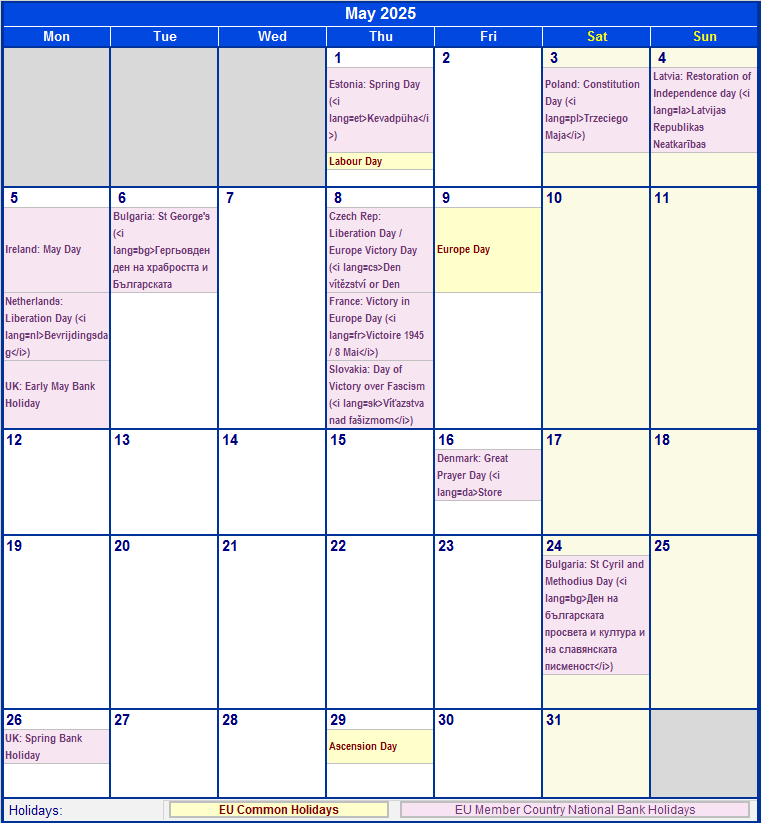


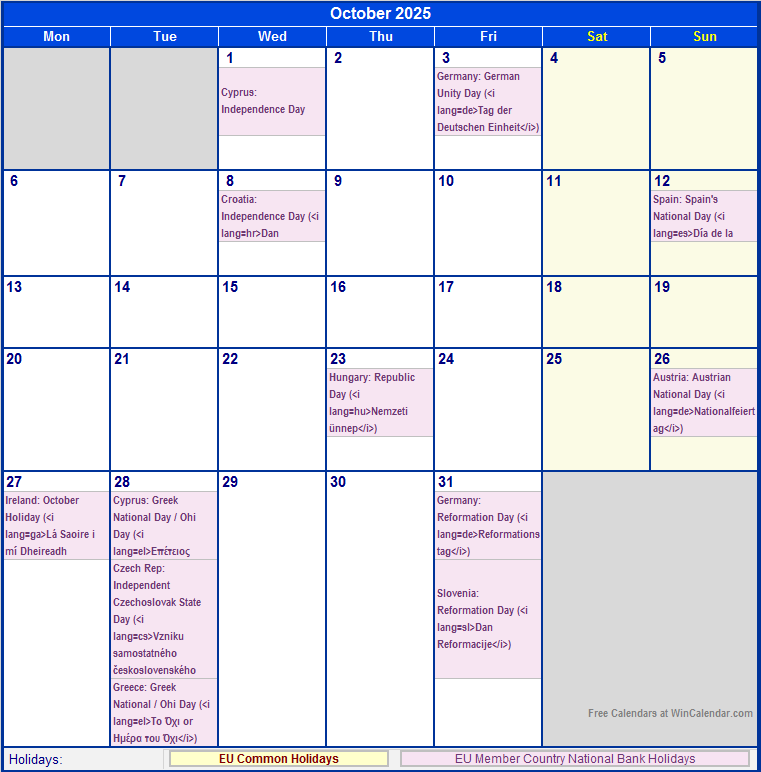

Closure
Thus, we hope this article has provided valuable insights into Europe Holiday Calendar 2025. We hope you find this article informative and beneficial. See you in our next article!